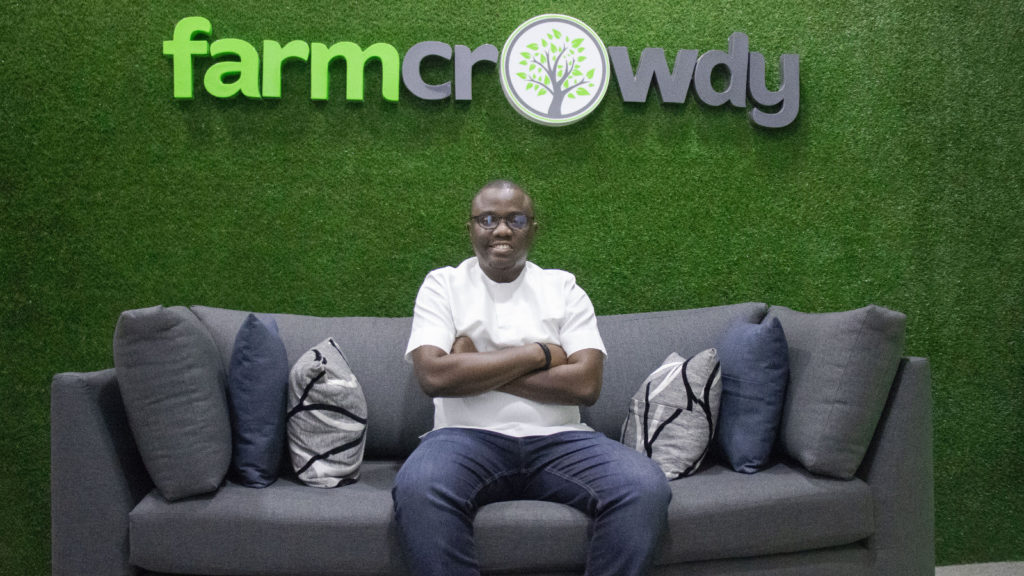We all have them. Those apps we open without thinking. Not because we need anything in particular, but because they feel… safe, in some…
Nigeria’s Farmcrowdy refutes allegations on insurance cover, Ponzi scheme, sustainability

Lagos based agritech startup Farmcrowdy has refuted claims by several Twitter users made last week that the startup has no legitimate insurance cover, is running a Ponzi scheme and that the business is not sustainable.
Farmcrowdy connects farm sponsors to farmers in a bid to increase high-quality food production. The startup does this by using sponsors’ funds to secure land, buy implements, and to insure farmers as well as their produce.
In March, the agritech startup — which was founded in 2016 by Onyeka Akumah (pictured above), Akindele Phillips, Tope Omotolani, Jimoh Maiyegun and Ifeanyi Anazodo — announced that it had raised $1-million to aid its expansion across Nigeria over the next 12 months (see this story).
Farmcrowdy has raised more than $9-million in sponsorships
Farmcrowdy is also the recipient of a $325 000 grant from GSMA’s Ecosystem Accelerator Innovation Fund. The startup has, according to Crunchbase, raised a total of $2.4-million in funding since it was founded.
In a now deleted tweet posted last Tuesday (25 June) (a screenshot of which is contained in a Farmcrowdy statement on 28 June), Twitter user “Adacampbell” alleged that Farmcrowdy’s insurer Leadway said the startup is running a Ponzi scheme.
“Leadway tells the client it’s just paper insurance and that Farmcrowdy is like MMM (a recent Russian Ponzi scheme — Ed). Anything can happen and the business will shut down. Client is taking here money elsewhere. It takes A LOT for business to thrive in these parts. Everything an everyone is out to kill you.”
The post led to other Twitter users questioning Farmcrowdy’s business model.
Lol.. Those guys are not doing anything near real farming.. Loses here and there yearly, but …
— Boye (@boye007) June 25, 2019
In the ensuing thread, Twitter user “boye007” alleged that Farmcrowdy pays its sponsors using grants.
Without giving proof, the user further alleged that the company “usually record(s) heavy losses” attributing these to bad agronomic practices and “unreasonable expectations”.
The posts raised alarm within Nigeria’s tech community.
This thread is scary. Are we building an ecosystem on cards? https://t.co/Fqciz2HUpP
— Victor Asemota (@asemota) June 26, 2019
Leadway responded to the initial post with its own thread:
Hi @Adacampbell, @FarmCrowdy is one of our clients. The company is an agritech platform that offers the public an opportunity to invest in agriculture through crowd funding. Leadway offers insurance services to @farmcrowdy.
— Leadway Assurance (@LeadwayInsure) June 25, 2019
Leadway explained that its cover includes death or loss due to fire, flood, lightening, aircraft damage, windstorm, pest and diseases for livestock, poultry, fisheries and crops.
Last Wednesday (26 June), Farmcrowdy issued a statement on its website where it addressed issues raised about its business model, agronomic practices, impact and insurance cover.
‘Model has been sustainable for two years’
Akumah pointed out to Ventureburn in an email today that the Twitter user that started the initial conversation had tendered an apology on the social network for having misrepresented the startup’s business.
Attn: I want to apologize to @farmcrowdy for any defamatory comments made against them.
Farmcrowdy have explained that they are not a Ponzi scheme and don’t indulge in business practices that put investors’ funds at risk.
Dear investors, please be at ease.
— Ada Campbell (@Adacampbell) June 29, 2019
He explained that Farmcrowdy raises money from “everyday people” who want to grow the agriculture industry, but do not have the time and resources to do so.
The startup, he said, then provides access to funding, technical knowledge and market access to rural farmers across the country using these sponsorships it raises.
Then, at the end of the farm cycle, Farmcrowdy sponsors get their initial sponsorship and return on their sponsorship. This while farmers get what he described as “good returns” from that farming cycle.
“This model has been sustainable for two years which has seen us work with more than 11 000 farmers already with a pool of 25 000 we intend working with in the next couple of months,” said Akumah.
‘No Federal government, State grant’
Akumah said the startups has not taken any grants from the federal government, or any state government.
“The only grant we have received since inception is from the GSMA innovation fund which was specifically aimed at supporting our efforts in bringing mobile technology to rural farmers, ” he said.
Akumah explained that the grant enabled Farmcrowdy to build its mobile app technology in partnership with the GSMA and its partners.
He pointed out that the startup has deployed the farmer’s management app to over 4000 farmers already.
Akumah said it’s not common for the startup to receive allegations like this.
“This is the first time such has happened and our FAQ page on our website addresses most of the recurring questions we get regarding our work,” he said.
He said this particular instance originated from a customer agent in Leadway Assurance who misguided the Twitter user in question.
“Unfortunately, the same person did not reach out to us at Farmcrowdy before posting the tweet and has since apologised,” he added.
‘More than $9m in sponsorship’
Akumah said that since its launch, Farmcrowdy has generated more than $9-million in sponsorships.
This amount, he said, has been deployed to work with 11 000 farmers across 14 states in the country who have cultivated a total of 16 000 acres of maize, rice, ginger, soya and cassava.
He added that Farmcrowdy has raised over two million chickens that have been sold to major buyers across the country.
“We have sold tons of our agro-commodities to major buyers like Afex when it comes to grains. Our ginger farm harvest will be exported at the end of the season to the Middle-East, our chickens are sold to the likes of AMO Foods who own Natnundo,” added Akumah.
Natnudo, he explained, is a major chicken distributor in Nigeria with a demand for 15-million birds per year.
“We have also started serving more than 35 cows per day to two of the major eateries in Lagos as a result of our cattle farms in two of the Northern states in Nigeria.
This is made possible with our recent partnership with Best Foods, one of the few government-approved beef processors in Lagos,” he said.
Last month, Farmcrowdy — which now employs a full time team of 50 members — got the Global Disruptive Innovation in Agriculture award from the UN Industrial Development Organization (Unido).
In April the company launched a new subsidiary Farmgate Africa, which will focus on providing major processors and international buyers the opportunity to purchase commodities directly from local farming clusters.
The company, together with Farmgate Africa, also has a partnership with online livestock market Livestock247.com which aims to bring together buyers, sellers, ranchers, feedlot operators, veterinary professionals, haulage companies, butcheries, abattoirs and financial services providers.
Read more: Nigerian agritech startup Farmcrowdy raises $1m in additional seed funding
Read more: Meet the 8 African recipients of GSMA’s Ecosystem Accelerator Innovation Fund
Read more: Five agritech startups that aim to take Africa into greener pastures
Read more: Lessons from a business sale that didn’t quite go right – Farmcrowdy founder
Read more: How football helped kick off Nigerian agritech startup Farmcrowdy
Featured image: Farmcrowdy CEO Onyeka Akumah (Supplied)


